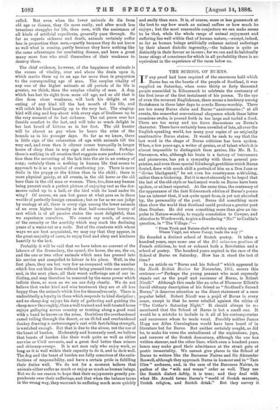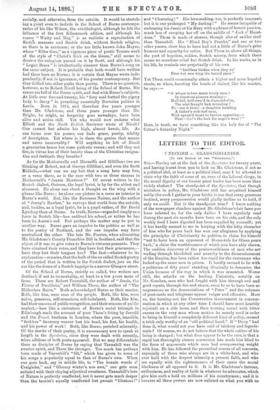THE SCHOOL OF BURNS.
IF any proof had been required of the enormous hold which Burns has on the hearts of the people of Scotland, it was supplied on Saturday, when some thirty or forty thousand people assembled in Kilmarnock to celebrate the centenary of the first issue of the first instalment of his poems. To the eye of even the reverent Englishman, there seems a tendency among Scotehmen in these later days to overdo Burns-worship. There are too many Burns clubs and Burns " anniversaries ;" at all events, the somewhat conventional eloquence which these latter occasions evoke, is poured forth in too large and turbid a flood. There are too many and too fierce discussions on Burns's character. There have certainly been unveiled of late, all over the English-speaking world, too many poor copies of an originally unattractive Burns statue. It would be rash to say that the last word in the shape of Burns criticism has been spoken. When, a few years ago, a writer of genius, or of talent which it is almost impossible to distinguish from genius, like Mr. R. L. Stevenson, who, although his brain is a factory of buccaneers and piccaroons, has yet a sympathy with those general pro- prieties, and even those special Edinburgh gentilities which Burns flouted, drew with much skill a portrait of him as a Don Juan or "divine blackguard," he set even his countrymen a-thinking,. rather than a-bickering. But it is most sincerely to be hoped that the last of the old-style or hackneyed words on Barns have been spoken, or at least reported. At the same time, the centenary of the appearance of the first Kilmarnock edition of Burns's poems has an interest that, if not quite apart from, is yet not absorbed by, the personality of the poet. Burns did something more than show the world that Scotland could produce a greater poet than Dunbar. He did even something more than give an im- pulse to Nature-worship, to supply consolation to Cowper, and stimulus to Wordsworth, to give a thundering "No I" to Crabbe's• question, in " The Village :"— " From Truth and Nature shall we widely stray Where Virgil, not where Fancy, leads the way I" He founded a distinct school of Scotch poetry. It takes a hundred years, says some one of the Dii minorura gentium. of French criticism, to test or exhaust both a Revolution and a school of poetry. The hundred years expired in the case of the School of Burns on Saturday. How has it stood the test of time?
In an article on " Burns and his School " which appeared in.
the North British Review for November, 1851, occurs this sentence :—" Perhaps the young peasant who most expressly stands out as the pupil and successor of Burns, is Robert Nicoll." Although this reads like an echo of Ebenezer Elliott's fervid obituary description of his friend as " Scotland's Second Burns," it deserves attention as the direct statement of a once popular belief. Robert Nicoll was a pupil of Burns in every sense, except in that he never rebelled against the ethics of " The Cotter's Saturday Night." It should always be rc-
membered that the School of Burns is but a small one. It would be a mistake to include in it all of his contemporaries and successors whom he made vocal. Possibly neither James Hogg nor Allan Cunningham would have been beard of in literature but for Burns. But neither certainly sought, as did he, to make his verse the embodiment of the aspirations, joys, and sorrows of the Scotch democracy, although the one has written stanzas, and the other lines, which even a hundred years hence may make good their admittance at the strait gate of poetic immortality. We cannot give places in the School of Barns to writers like the Baroness Nairne and Sir Alexander Boswell, although they approach Burns in humour and in " Tam Glen" archness, and, in the case of the Baroness Nairne, in pathos of the " wife and weans " order as well. They use the Scotch dialect deftly, it is true ; and they deal with what Mr. Arnold terms Burns's " world of Scotch manners, Scotch religion, and Scotch drink." But they survey it socially, and otherwise, from the outside. It would be stretch- ing a point even to include in the School of Burns contempo- raries of his like Wilson, the ornithologist, although he felt the influence of the first Kilmarnock edition, and although his coarse " Watty and Meg " is as realistic a reproduction of Scotch manners and Scotch drink, without Scotch religion, as there is in existence; or the too little known John Mayne, whose " Siller Gun," as a vigorous piece of poetic Teniers work of the style of "-Christ's Kirk on the Green," still seems to deserve the eulogium passed on it by Scott, and although his -" Logan Braes " is intellectually sincerer than Burns's song on the same subject. It is probable that both would have written had there been no Burns; it is certain that Mayne wrote inde- pendently, if not in ignorance, of his greater contemporary. But they drifted into other paths than poetry. There is no question, however, as to Robert Nicoll being of the School of Burns. His verses are full of the Burns spirit, and deal with Burns's subjects. At little over five-and-twenty, his "fiery soul fretted the pigmy body to decay " in preaching essentially Burnsian politics in Leeds. Born in 1814, and therefore five years younger than Mr. Gladstone, and three years younger than Mr. Bright, he might, as longevity goes nowadays, have been alive and active still. Yet who would now endorse what Elliott and the North. British Reviewer wrote of Nicoll ? One cannot but admire his high, almost heroic, life. As one tarns over his poems, one finds grace, purity, fidelity of description. Yet where is in them the genius that means and earns immortality ? Will anything be left of Nicoll a generation hence but some pathetic verses ; and will they not live, in virtue less of their beauty than of the Christian resigna- tion and fortitude they breathe ?
As for the Motherwells and Macneills and Gilfillans (we are thinking of Robert, not of George Gilfillan), and even the Scott Riddells,—what can we say but that a song here may live, or a verse there, as is the case with two or three stanzas in Motherwell's " Jeanie Morrison ?" Of recent writers in the Scotch dialect, 0 utram, the legal lyrist, is by far the ablest and sincerest. He alone can shoot a thought on the wing with a phrase like Burns ; be alone can picture in a verse an interior in Barns's world. But, like the Baroness Nairne, and the author of "Jenny's Bawbee," he surveys that world from the outside, and, besides, as a legal lyrist, he is a pupil rather, of Sir David Lyndsay than of Burns. In truth, Burns—regarded simply as a force in Scotch life—has outlived his school, or rather he has been its Aaron's rod. But perhaps the matter may be put in -another way. Burns gave an impulse to the politics as well as to the poetry of Scotland, and the one impulse may have neutralised the other. The late Mr. Forster, when advocating Mr. Gladstone's County Franchise Bill in Scotland, said that the object of it was to give votes to Burns's virtuous peasants. They have obtained their votes, and they have lost their grievances,— have they lost their tongues too ? The fact—whatever be its -explanation—remains, that the balk of the so-called Scotch poetry of the period that is written in the Scotch dialect, jars on the -ear like the drone of a Scotch bagpipe in a narrow Glasgow street.
Of the School of Burns, strictly so called, two writers are destined, if not to immortality, at least to a few years more of fame. These are Robert Tannehill, the author of " Jessie, the Flower of Dunblane," and William Thom, the author of "The Mitherless Bairn." Both acknowledged Burns as their master. Both, like him, were sons of the people. Both, like him, were naive, generous, self-conscious, self-indulgent. Both, like him, had their seasons of public recognition, and their seasons of public neglect,—how like a caricature of Burns's social triumph in Edinburgh reads the account of poor Thom's feting by Jerrold and the Punch brethren in London, where the poor, irascible, " feckless " Inverury weaver lost his head, his feet, his health, and his power of work ! Both, like Burns, perished miserably.
Of the merits of their poetry, it is unnecessary now to speak at length in the Spectator, since they were dealt with recently, when editions of both poets appeared. But we may differentiate them as disciples of Burns by saying that Tannehill was the /sweeter spirit, and Thom the stronger. Too much has perhaps been made of Tannehill's "lilt," which has given to some of his songs a popularity equal to that of Burns's own. When one goes back, say in middle life, to " The bonnie woods o' Craigielea," and " Gloomy winter's noo awe," one gets soon satiated with their cloying adjectival sweetness. Tannahill's love of Nature is perfectly unaffected, but it never gets much deeper than the tourist's equally unaffected but prosaic "Glorious !" and " Charming ! " His love-making, too, is perfectly innocent, but it is one prolonged " My darling!" He seems incapable of embracing his Jessie or his Mary with a phrase of honest passion, much less of carrying her off on the saddle of " Jock o' Hazel- dean." Thom is made of sterner, though also of sadder stuff than Tanuahill. His " Blind Boy's Pranks," and one or two other poems, show him to have had not a little of Burns's grim humour and capacity for satire. But Thom is, above all things, the poet of hopeless, sodden, Scotch misery, from which there seems no mundane relief but Scotch drink. In his works, as in his life, he reminds one perpetually of his own
" bieldless birdies when they ca' Free wet wee wing the batted anew."
Yet Thom could occasionally attain a higher and more hopeful strain, as when, bursting the bonds of dialect _like his master, he says :—
0 whaur is love maist lovely seen ? In timorous glances stealing- half-own'd in diamond-e'en, The soul-fraught look revealing ? No—see it there—a daughter kneeling A father's sick-bed near,
With nprais'd heart to heaven appealing,- That—that's the look for angel's wear !"
Here, in truth, we have something like the holy fire of "The Cotter's Saturday Night."
41



































 Previous page
Previous page